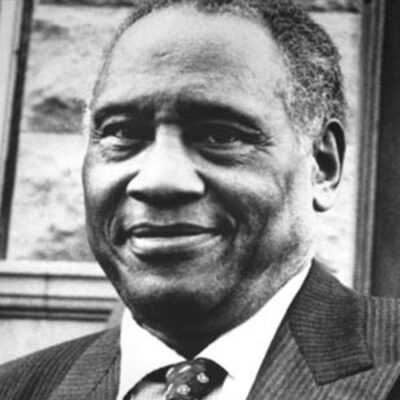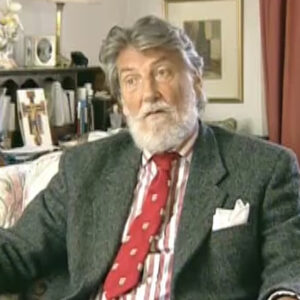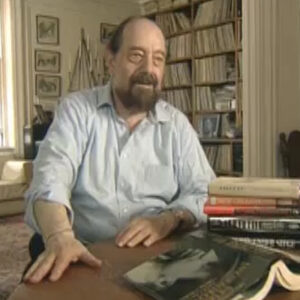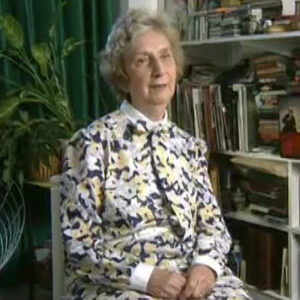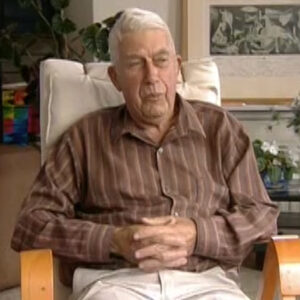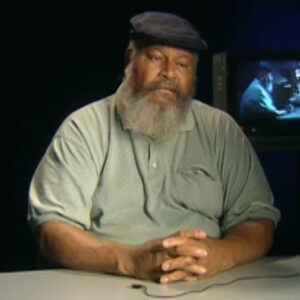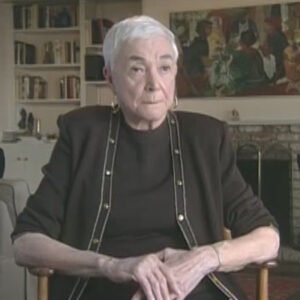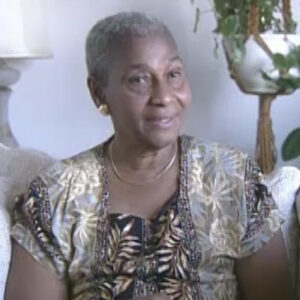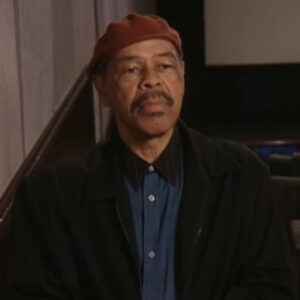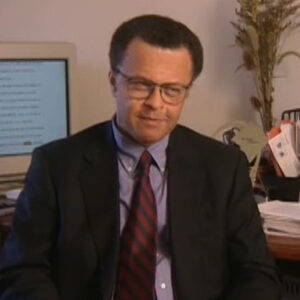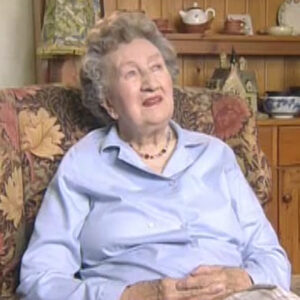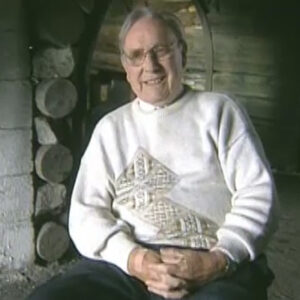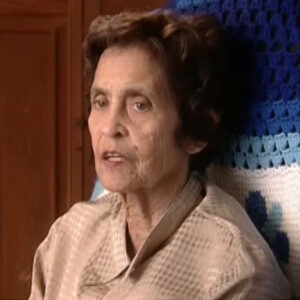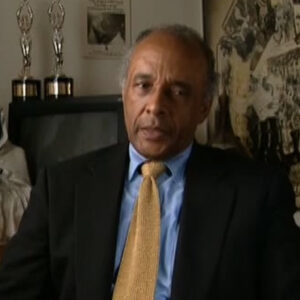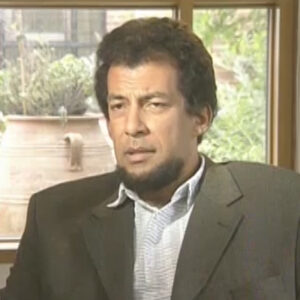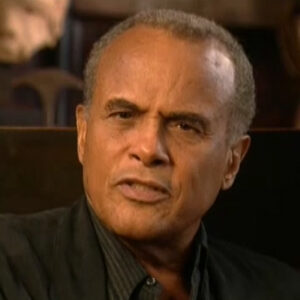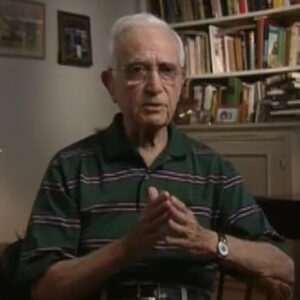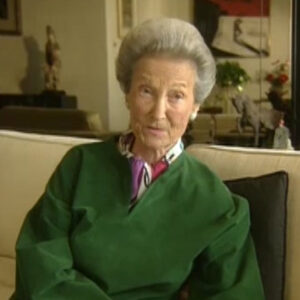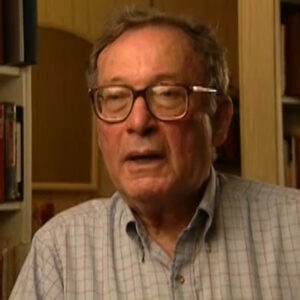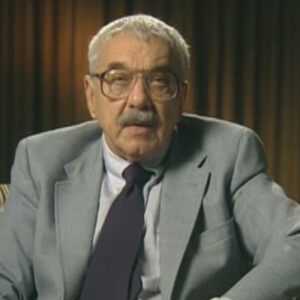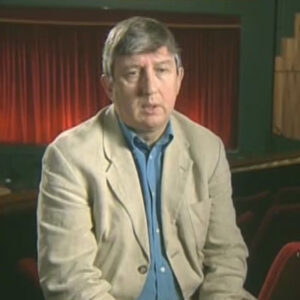Speaker Yeah, my memories go back to the age of four, I’d say four and five, which would have been 1957 58. I have a strong sense of myself in the world around me and everybody. And I guess the one what we used to go up to GML terrorists all the time. I always saw it as like kind of my good fortune that he was stuck at home in a way because he was there for me. I mean, I really grew up with him as grandpa. And, you know, the parents dump the kids with the grandparents and take off. So my brother and I just had a ball. We’d come up here and, you know, get to run around and do whatever we want.
Speaker And they were great doting, you know, grandparents. Oh, yeah.
Speaker You know, it was low key, you know, just little things. It wasn’t anything formal. He was just kind of real chill, basically. But what I do remember or was kind of like the I don’t know, something about it. And he would play with us. He would just chase us around the house, which was a lot of fun because he was so huge. And, you know, we were little kids and running around. And I just remember always he would he would say, come over here and he’d sit in this big easy chair, kind of all sprawled out.
Speaker And then you kind of say, OK, run. And, you know, this little kid, you think you’re running and running and running.
Speaker And then these arms, which is from the chair, wouldn’t get up, just reach out. And this embrace would go like that. And there was something about that that that is sort of like the memory I always go to in a visceral kind of way. And I’ve thought about it a lot. And I think it was for me, it’s kind of what he that embraces what he’s been for me in my life. I mean, he has embraced me in my life and my world and who I am in that same way. I mean, I’m out there, you know, doing my thing and all of a sudden I’m still in his embrace, no matter where I go, what I do. And I think that’s why I’ve always stuck to that or held on to that memory.
Speaker You know, when was the first time you realized, you know, the greatness of it, you know, the importance of it?
Speaker When did that in that same period of time?
Speaker I do remember his one of his comeback concerts at Mother’s AME Church in 1958. And so I was five, you know, and that was I think and there was also the transatlantic concert in 1957 and from the studio to to Wales. And that I remember.
Speaker But the concert was different because all my friends in the neighborhood were there. There we were in the church, you know, in the second row. And, you know, sort of my whole world was was there. And that was my first experience of him singing in concert.
Speaker And, you know, I was just, you know, I was on top of the world and I remember going back during the intermission backstage and set me up on his knee. I was like, OK, you know how you like me now? Kind of thing was how he was talking to me. And I remember saying, but you didn’t look at me. And I just remember this sense of, you know, he belonged to me and why wasn’t he singing for me? So then he did, you know, at the next and during the next songs.
Speaker But I mean, just one question. The transatlantic concert is a picture of you all there. What do you remember about that? Because as a fellow in the film that plays music.
Speaker Yeah, I don’t I don’t have you know, I don’t have. And it was for you know, I don’t I don’t really I just remember being there and the atmosphere, the excitement, you know, the tension and and just as.
Speaker You know, seeing him in that role, I guess, as the public figure and but no, I don’t have like any brilliant anecdote for you on that, but I do you know, it was a part of my. Kind of.
Speaker Realizing and understanding his presence in the world.
Speaker Certainly. Now, you said you started. You said you started looking in the library and you discovered those photographs at 10 years old, it seems kind of young. To me, for the kid, for a kid to get into that material, that what did you what are you into it? What did you feel about those photographs that made the book?
Speaker Well, I was just fascinated with the images and the stories they told. And they they kind of dovetailed with the stories that I was always getting because I was just always asking, you know, questions. And I mean, the story that that, you know, really stuck with me was his experience in Spain during the Spanish Civil War. I mean, you know, I my grandma, grandpa saying and stop the war. You know, that was that was how that read to me, you know? And so what was that? You know, what was that power? Who you know, what did that. So I think it was just that kind of curiosity. But the imagery of first of all, he always towered over everybody. It was always bigger than everyone else. He always had a light that you could see in those photographs. And and also there were there were just things that my grandmother had gotten in her travels all over the world. So it was like a piece of the world, you know. Kind of all there for me to sort through and go through and and I always felt that like my education in my school with my classroom was his bookshelves and his home and those those things I mean, I called it the museum closet. I felt that I had my own private museum and it was all packed up and wrapped up. And so part of the ritual for me was the unwrapping of the object and and and it revealing itself and then looking at it and thinking about it and then going through the photos, you know, and and then, you know, putting them, pairing them the way I wanted to. And you’re just interacting with all of this stuff. Yes.
Speaker Which did lead to that, which is really the center of.
Speaker I don’t know where that will get. Yeah. What’s a red diaper, baby? How are you one?
Speaker Well, I don’t wear diapers anymore. I mean, ma’am, I know a red diaper baby is a child of parents or family that came up within the communist movement, the progressive movement of the 50s.
Speaker And so, however far back or of the left, a baby of the left, you know, progressive movement, I never felt.
Speaker And and from what I’ve gleaned, as I’ve, you know, met people over the years, a lot of red diaper babies have often react against that whole climate and atmosphere and sort of philosophy and way of thinking because it was pushed on them as kids. And I never saw myself as a red diaper baby because the way I was raised, there wasn’t this you know, this is what you’re supposed to think and this is what you’re supposed to believe.
Speaker And this is the line and this is the politics. There was none of that around, really.
Speaker So I didn’t feel inculcated in anything of anything. I had to dig for anything. It was it was it was very low key. And I had to go search it out and find out. And and it was, you know, the atmosphere was, you know, you have to figure things out for yourself and learn to think for yourself.
Speaker Countries where we’re talking about. Oh, yeah. Oh, you said something. You said that in looking at the pictures that he.
Speaker Towered above everybody.
Speaker But also that he had this ray of light, you say now in your book, you said, Ray, the ray of my grandfather’s light shines in each and every one of us now.
Speaker I mean, is there a connection to that? I mean, what was this light that you saw? I mean, was your head looking at him as a center or did he actually see the light in the photograph? I mean, I know it wasn’t a real life, but was there a vibe that you saw that affected everybody around him?
Speaker In the photographs, I mean.
Speaker Yes, he was always everyone was always clinging to him or attached to him or somehow, you know, looking up, and there was always this sense of awe and reverence that I could see in these photos. And it was like he just pulled everything. He just, like, pulled everything to him.
Speaker And I mean, not that I could articulate that as a kid, but it was very clear to me, looking at all these photos in your family life, from your consciousness until now, until now, that you do that, I mean, your family. I mean, was he like the absolute center?
Speaker Were there pools of independent centers in your family?
Speaker You know what I mean? Well, certainly in a symbolic sense. I mean, in terms of an impact, you know, not in a literal sense, but just in terms of of his impact and effect on my family and me. Yes, he he was the overwhelming dynamic that defined so much of everything. I mean, we all had our own lives and but but that was always there. And for me, I always felt it as a blessing.
Speaker Was it OK to talk about that? How did how did it affect you? How did it help you? How did it make your life? You know better in a way.
Speaker I think that I had such a sense of roots in the literal sense of the word, I mean, I knew I knew my history and that I felt so grounded in knowing my place in the world and that he certainly brought that a there was a whole set of I mean, as I look back, there was a whole set of values that were just in the air that kind of came with the air I breathe that have you know, it’s like it’s like he’s a tap root for me, you know, it’s what goes deep down and keeps me centered and focused. I think I learned how to be fearless in the world without really realizing it, how to think for myself, how to figure out who I am and what I believe and just do it. And it doesn’t matter what anybody else thinks or is doing. I mean, that came from just that example and everything that he represented and how I interacted with it over the years and all the people that, you know, told me stories and all the things I saw and heard a sense of compassion. I think I was I know that one of the things that has moved me the most throughout my life of being Paul Robeson’s granddaughter is the effect that he being witness to the effect that he has on people and how he touched people and that his message to people come up to you of, oh, all the most recent experience I had. I was at a program for the centennial celebration, a centennial celebration. And a man walked up to me and said, you know, when I met your grandfather, I shook his hand. I felt like I had a blood transfusion. Know that’s one extreme. Or like what it was, was the range. You know, it was like the the the numbers runner on from the numbers right on the corner to the king of Sweden, you know, kind of thing. There was this incredible span from the, you know, top to the bottom or however you want to look at it, that who had this reference, reverence and respect for him. And I remember that during the viewing when he had passed and there was a public viewing Adventist funeral home in Harlem for, I think three days, if not two or three days. And I just sat in the back the whole time and watched this, you know, parade of humanity come through and pay their last respects. And I remember literally there was a time I think was the ambassador from Sweden or some head of state or something. And right behind him was it was a guy I had seen kind of like almost in the gutter, like when I was coming there earlier. And it was like he had dusted himself off and cleaned himself up. And there he was behind some head of state, you know, both there to pay their respects. And, you know, that day they didn’t even they didn’t take them. There was no no that day, you know that. So there was it was just, you know, always this this this incredible impact on on an extraordinary range of people. And that that touched me. I mean, I learned to look at, you know, you understand somebody from how they affect other people and. Yeah, yeah. And the other thing, they’ll just, you know, around the house, he was a very he was very, you know, like not retiring, but just laid back.
Speaker And so I had this you know, I saw the many dimensions of greatness, I guess, when you think about it.
Speaker And in that sense, I always it was a privilege and a blessing because it was a great humility and respect for just humanity, the humanity in every person, no matter what station in life they had and that came through at a real early age have to question that.
Speaker I mean, I have a lot more, but there’s one on that.
Speaker First, when you when you became conscious of him, where was he in his life? What had happened was, you know, look at that.
Speaker When I first really was I guess, became conscious as I was, you know, four or five years old, 1957, 1958. It was pretty much the you know, the it was the McCarthy Times. And it was. The period when he was under tremendous pressure and, you know, was probably the single most persecuted individual in the history of this country, when you think about it. And so there was a lot of tension in the family. There were rules. And there was we learned I mean, I learned early on about security and privacy. There was a call to call his house a Domhnall terrorist on the phone you dialed. Once you dial, let the phone ring three times, hang up, dial again, let it ring twice, hang up, dial again, let it ring once, hang up. Then they would pick up. They knew that was the inner circle. And I also knew as a kid, I couldn’t tell anybody that that was something you didn’t repeat to anybody. So there was there was a sense of being besieged, I guess, as a family and having to have, you know, a certain kind of protection and armor in a way, with the world. And then you knew you learned as a child the things that you couldn’t repeat outside the home. And, you know, what was off, you know, off the record and on the record kind of stuff. And I mean, that was normal. That was that was my norm.
Speaker So did you see your father? I mean, how how did as a kid how looking back now, how do you think that affected.
Speaker Your father’s behavior to you, and he’s also the head of the family.
Speaker Well, I mean, on the other side, my parents went through enormous lengths to protect us all from that, my brother and I. And so, you know, there was it was a normal household, you know, and we did all the normal things kids did. But there was this other layer that was present. And I think that parents generally, when they’re busy not doing something or not letting something, you know, affect the kids, the kids always pick it up. There’s this underlying tension that kids just have radar for. And so try as they might. I think my brother and I, we were both aware of of problems and issues and stuff like that.
Speaker You asked me about how he reacts to, uh. Yeah, yeah. I mean, that’s what I wanted. Yeah.
Speaker He was fiercely protective, you know, of our normalcy, my father, you know. So do you think that he succeeded?
Speaker I mean, do you think I mean, do you think do I think I’m normal, you know, grew up in a normal life to the extent that, you know, given all at all is extra special things that are in your life. Do you think you are how long?
Speaker I think I was normal and special. You know, there was a sense of of being like everyone else, but also being different. I must say. It was it was like that dimensional. It wasn’t either or. It was both because, you know, we did everything all the other kids did, hung out in the street and played all day and scuffed up our shoes and played Loades and, you know, all the crazy stuff that kids did and had our friends and our buddies and ran all around. But on the other hand, there were there were certain expectations, certain behaviors that weren’t allowed. There were certain, you know, limit limits around the house, you know, when grandpa was around or, you know, you had to do things, you know, so it was all there.
Speaker So I’d say both, you know, all of the above, you know, which is interesting because I think I learned early on how there’s just a duality to everything, you know, I mean, just sorting out my identity as a black woman, you know, that’s how you dealing with duality right there, dealing with our family, you know, you know, and so dealing with issues of race were about duality for me. And, ah, we lived in Harlem. We grew up in West Harlem like, you know, a very ordinary family. Yet we went off Enschede and we went camping. No one else on the block did that, you know, but yet we were like everybody else. We hung out. We had, you know, so there was always this. And looking back, I think that in a sense that my parents did succeed because there was that richness of of belonging and yet the richness of being different. And so you’re an insider and an outsider.
Speaker You know, at any point in your life, did you or your brother ever say, I can’t take it, this Robeson thing is killing me?
Speaker I don’t you know, I’d like to get out of it for a minute.
Speaker Well, I can’t speak for my brother, but, um, no, I don’t think I ever felt it like that. I do remember wanting to drop out of high school because I was just bored and I was like, good to go. I knew where, you know, and I was frustrated and I was angry. It was, you know, 68 and stuff.
Speaker And that is kind of like, you know, you know, that’s not I mean, granddaughter Paul Roberts is going to be a high school dropout.
Speaker You know, just, you know, that’s not an option, you know, but I don’t think I ever translated it into I don’t want to be a ropes. No, I never felt so. There were always those issues. There was certain like, you know. Just things you couldn’t do, and there was always this pressure of you have to perform because if you mess up, it’s going to reflect on him, it will tarnish his image. That was very strong action. Thought about that for a long time as a as a as an adolescent and as a teenager. But because I just felt this love, you know, I mean, I just felt so connected and so embraced by him in his life and his spirit and everything that that was OK. You know, that was OK. That was just an extra thing. So I never felt I want out. I never felt that way.
Speaker OK, this is sort of a hard question, and I may think you’re meant to get into it, but responsibility is always a double edged sword, you know, it really is.
Speaker So you’ve talked about giving you strength.
Speaker Nurturance means you she has helped you define yourself.
Speaker No one knew and then to your family.
Speaker What are the downsides of that?
Speaker I mean, that downsizing in the sense of you able want to do it, but, you know, in growth is always pain and sometimes friction to go to another level. So how did. His. Reputation, his achievement, and the love that people gave him. What stress, what pain, that pain, but what kind of stress did you go through to achieve that? You know, the head that you have now, you know, I mean, did it. Did it? A little abstract here, let me try.
Speaker Yeah, yeah, yeah, keep going. Yeah, what I’m trying to say is what was the flip side of the nurturing that you got?
Speaker What was the hard part of being or Robson’s? Your granddaughter. You know what what stress they put on you and your family to be in that situation? I mean, it had to be some you just had to be, you know. To be the daughter of a famous in a famous family. You know, and from what you see, what things do you think that you’re an adult?
Speaker Your father?
Speaker When Bill being that you mentioned earlier, the whole responsibility of him having to, you know, go out to a movie and I was like a military operation. That’s the kind of stresses that I mean.
Speaker You need a minute to think about it, then I can. Yeah.
Speaker Well, that’s for certainly, but, uh, I think I would say that I think I think I just get my brain go and, um.
Speaker Some of the ways that maybe that being the granddaughter of Paul Robeson has affected me and probably negative ways or that I’ve had to work through stuff, not because for me it’s all been it’s like there’s a growth process in this is a real and an issue in my family, a sense of.
Speaker Issues around privacy.
Speaker And I remember there were times people used to see me as very aloof, which I was always very startled by, and I think I ended up with a certain kind of reserve. And I always you know, you’re either out here or you’re on the inside and I lined people up, I think in my life, you know, there were the acquaintances and then there were the the few inner circle. I certainly carried that into my life. I had an inner circle. And I think that has, you know, cut me off from people and from the spontaneity of just letting go, you know, I mean, I have to like know that, you know, I can trust you to the to the death, you know, before I let you in, because you don’t expose yourself, you know, unless you have that that connection with somebody. And I’ve struggled with that. I think I have. That has I mean, only as I’ve grown older and gotten more mature have I figured out how to how to work with that and make a balance, find the balance. There were things I had to balance from from so so those were issues around privacy, you know, that kind of reserve. Do you think that the other thing is just in thinking, you know, not that long ago it like hit me like I’m the third generation out of slavery in my family, three generations from slavery. And looking at my grandfather, his father was a slave. Now, that was his primary parent. His mom died when he was six. So what kind of parenting, what kind of patterns have been inculcated in my family? You know, they definitely got some stuff hanging over from slavery. Times is for slavery times, not for these times. That doesn’t work anymore because I see that in my own family history. I mean, I grew up in my father and mother, you know, raised a family in the midst of of of of a hysteria of which we were, you know, center stage. So there’s a kind of paranoia and instincts and constructs in relation to paranoia that I have that come from my family life. And I’ve had to learn to take some of that stuff and just leave it behind, because that comes from another time. And I don’t need to carry that on and I don’t need to see the world in that way and walk with those those eyes of, you know, where’s the agents and, you know, think, you know, what are the clues? I mean, I know all that stuff, you know, and it comes in handy. But so, you know, there was a lot of that. I mean, certainly just, you know, emotional issues got very tamped down. I mean, they do in all families, but they got real tamped down. You know, you just had to deal with everyday stuff. Feelings didn’t really get talked about a lot. I mean, that must have been how what was going on in his family, you know, as well as my mother’s office, because there’s two sides. But his dynamic overpowered, you know, the other side in a way. You know, so much of our family life was powered from that side. So there were definitely things there that I’ve had to work through, you know, that were that were because, you know, if you’re under siege, you know, and, you know, he’s like, you know, occupies the stage that he does in the world, you know, just blab and all kind of stuff. And, you know, you’re not as free a human being about who you are and your personal stuff. Your personal life gets shunted aside in certain ways and and less worked out. I think actually, I think personal issues now that I get less processed because of the the the dynamic of the famous person, the public family. Yeah.
Speaker OK, let’s just go over another thing about the the the motivation for wanting to. To be independent as opposed to, you know, so ask me how. Is so OK, so now. My original question was, was there ever a time when you really did not want to be a Robson’s on the operation as a fact, that’s how this I mean, because even your remarks about yourself, you may not know this, but they really inform informed about I.
Speaker I mean, it’s taken me a long time. You’re comfortable with you had to figure things out, but also to get comfortable talking about.
Speaker Him in my life in a personal way, and I’ve and because it was a no no.
Speaker Let’s go now inside. That’s all right. No, no, actually, I want to say that. We’re OK.
Speaker Yeah, yeah, it’s taken me a long time to get comfortable talking about.
Speaker My life as a robe’s in a personal or talking about me personally, and because it was a no no in a way that because you exposed you didn’t expose yourself, I think that was a piece of it. And there is something good in that.
Speaker I mean, you learn I mean, there are good survival skills and it was good training.
Speaker But I’ve had to go back and get some other pieces, and and to me, what’s important about.
Speaker Reflecting.
Speaker Personally, you know, being more reflective personally and some of the emotional issues or whatever it is that I think it helps other people.
Speaker Because.
Speaker Even someone as great as he in so many areas.
Speaker From, you know, personal and, you know, professional and political and, you know, just the whole gamut, personality, I mean, just greatness of spirit and has issues and has has weaknesses and has problems and misses stuff. And so if someone like that goes through it, then it almost empowers me, the little person, to have those same feelings and to struggle with the same issues. And it almost it Val, it helps validate the importance of everybody. And that’s one thing I think, that has moved me the most about his life, that every single human being is as important as the other. That was something that was so strong in the way I was raised, actually. And what I think was really my parents’ gift to me was we came up in the hood. What was the hood at the time? One, because that was all they could afford, but they didn’t want.
Speaker My grandmother’s money is money, you know, to send us to private schools and to live in a better place because they felt it was important, you know, that that is kids. My brother and I be grounded and rooted.
Speaker And that is something now as I go through life and I see other people particularly like out in Minnesota, you know, where there’s like there’s so many black folks out there who’ve grown up in this lily white world, I don’t know who they are or anything. You can’t go back and get that stuff. You can’t go back and get that that sense of who you are and your place in community and world and space and time.
Speaker I got a question for you.
Speaker He.
Speaker Well, I mean, you’ve talked about what he was to, but.
Speaker Everybody seems to have. They happen.
Speaker Let me say they all everybody subscribes to the fact he was a great man. He was, you know, but everybody thinks that he was talking to them, you know what I mean? Everybody. Yeah. Now. And at the same time, though.
Speaker He was private. He really he seems to really have been private, but now. Did you get a sense of that?
Speaker You know, there’s this this phrase that that woman uses, but also your father uses and I know they’re at odds, but they both agree on this, which is that he was a man of a thousand pockets. He had friends like you. So now that you have a sense of that and also.
Speaker What was your take on your grandparents marriage and relationship? Because it’s really OK.
Speaker There’s a lot of things you to take it one at. Yeah, sometimes you putting too many things into question and then I get yeah, I OK, this one was the man of a thousand and pockets.
Speaker Yeah, when people come up to you, did you did you have a sense that. When they said he was special to me. That that was actually true or was it just or right?
Speaker Yeah, I think that part of that is that he had this extraordinary capacity to talk to your soul.
Speaker Playing for as far as possible. Don’t lean too over that way, because you’re right.
Speaker Well, yeah.
Speaker All right, so should I sit back more than up or does it matter?
Speaker OK, now you are just to push me back. You know, it’s a question of he said when he spoke.
Speaker Yeah, he he had. And I’ve only put this together. Well, he had an extraordinary capacity to. Relate directly, relate to your soul, to speak to you, to if it was better the first time. But anyway, now he had an extraordinary capacity to just talk directly to your soul. He just cut right in there. So the experience of interacting with him for somebody was this extraordinarily empowering sensation because he was a human being who kind of cut right to your core and and let you in on his.
Speaker And then you had an experience on that level. There was always these experiences at that sort of heightened transcendental level because that was how he moved. That was his because he had all that power and energy and whatever that it that was what that was. So all of those experiences were real for people, even though he made, you know, it did happen and it was going on.
Speaker The other thing that that I’ve.
Speaker Noticed or figured out is that I think because he was so multi-dimensional that his life operated simultaneously on more planes than you and I could imagine.
Speaker In more areas with more people, in more parts of the world, all simultaneously, all real and all is important to me, had that great that’s what greatness of, you know, character is about or whatever.
Speaker So. So.
Speaker The worlds didn’t meet or collide, most normal people live, you know, like in a little box this big. So, yeah, everybody runs into each other. But his was so huge that no one could possibly know everybody else. So there were lots of satellite worlds all spinning, all moving in and out of them. And it wasn’t because there was some nefarious, you know, reason for, you know, or some subterranean, like, plot or plan that he had to his life to keep this one or this woman should know that it was just they were off in other worlds and he liked being over in that world because that but he also was in this one spinning over here and they weren’t as large as he was. So they couldn’t make all those conex. And I think that’s why so much of that happened in and I know just from my little life and my little experience that I sometimes look back and like I have all these separate pockets going and none of mine, none of them cross. I figured out at one point that I had all these separate pieces to myself, but where was the hole? I didn’t know how to put the hole together because maybe that was the pattern in my family, you know, and and not that I miss. You know, my life is fairly multidimensional just because I come from such a broad frame of reference. That was the norm for me. And I had to figure out how to do that. It was the hardest damn thing. We just introduced friends to each other and connect the circles up. There was something very scary about that now.
Speaker The one element that’s essential is SC and Paul, I mean, that was a relationship that lasted for a long time and obviously a different form because their.
Speaker What do you I mean, you know him, a grandparent, so you’re your kid, but now as an adult, you’ve read and thought, I’m sorry, what was your take on that? I mean, what did what do you think the nature of that relationship was?
Speaker I mean, it changed, I think, as any relationship, you know, it went from, you know what, over 40 some odd years. So it certainly changed many times from what I have observed, you know, and read and heard and listened and stuff as his life changed and as they changed. So I don’t know that I could sum that up. And what was the nature of that relationship?
Speaker Certainly there was a sense of loyalty to one another.
Speaker That regardless of what was going on in the marriage, which had its ups and downs, from what I understand it, its moments of, you know, being real and not being real, that there was that that loyalty to what that represented in and this family that it represented, you know, which is admirable, but also, I’m sure was painful.
Speaker Um, do you think that the loyalty to the relationship or the relationship was equal on both sides, if you know that? I mean, you may not know that. So, you know, my sense is that as a really.
Speaker Put a lot of time to really put a lot of time in protecting his back, you know, from the very beginning to his manager.
Speaker We had a woman and she still said, look, OK, this is not public. You know, we can deal with it. Then it got public. She said I that’s it. Then he came back and, you know, and even then in the film, your father says, well, look, you know, she was hurt, but. You know, they decided to hang in and they were just going to ride the wave, whatever happened, they just were going to do that. So.
Speaker Uh.
Speaker I guess I sort of answered my question, but but. Is that what in retrospect now from the inside of the family, is that basically.
Speaker Because if that’s what it is, then it would be good if you said that, because it would be good for somebody outside of the immediate, you know, generation to say that.
Speaker Yeah, I think that that between ASIC and Paul, I mean, she she was a trooper, she was the trooper of the two in the relationship, I think. I mean, from what I’ve observed, who really.
Speaker Stuck it out and hung in there through, you know, all the all his wanderings, you know, and and she was determined and that was if I learned determination from anywhere was from nada. Lord have mercy. She was formidable. I mean, nothing could. I just who she had a a perseverance and a determination that was just unstoppable and she was a little bitty thing, you know. So, yeah, I think she I mean, she worked at it and it was important or I think I think it was also important to her to be Mrs. Paul Robeson. You know, and she had certainly earned it, you know, and deserved it and, you know.
Speaker But, yeah, I had no idea of anything going on as a kid, I mean, because they were always, you know, the pair and, you know, together and around or when they weren’t, it was there was a reason, you know, so I had no sense of any of anything as a kid.
Speaker And that was really in the time when he had come back to the fold. You know, when I was coming up, it was it was the family thing. It was the grandparents, you know.
Speaker Did you ever get a sense, uh, I’m sorry, but I got a sense. Yeah. I mean, I just I said that was a good answer. I mean, I really. It’s clear. Clarify stuff. OK, you really clarify.
Speaker OK, yeah. Because you have a sense of what everyone else, you know, I mean, repeating what everyone else is saying. Yeah.
Speaker You saying it, it makes it more important to be honest.
Speaker Did you ever get a sense also let me just say this. There was you know, it was like the world out there and my parents went through this, too. Not that I mean, you know, that the world wanted you to fail. They wanted that relationship to end. They wanted to split them apart. They wanted to see his foundation crumble. And I think they both felt that. And, you know, I mean, my my mother has told me over the years how, you know, people have read, you know, in this gossip column or that, you know, I mean, when I was that, you know, Marilyn and Paul Robeson Junior had split up in this in that or, you know, it was like they were supposed to fail, you know?
Speaker And so that was a pressure on the relationship. And certainly for them, you know, they wanted to, like, crumble him at the foundation.
Speaker So I think they both kind of, you know, why do you think that people want them to fail? What does it I mean, why? Well, I mean, he was.
Speaker I think a power that was.
Speaker Unmanageable. He answered to no one but himself. And so I think that was threatening to the powers that be. You couldn’t, you know, wasn’t money, couldn’t buy them off. I mean, he had this this this code of of, you know, of ethics, you know, so you couldn’t kind of, you know, can’t you know what I’m saying?
Speaker And so how else do you know? It’s like how can you undermine and control this force out there? Well, that would be a logical one. You know, get them at the root of the homestead. So I think they both sense that they needed a firm.
Speaker Home front got to be in order. That was certainly a strong thing that I got in my family home front. You know, you got to be united. And. Cover each others, but that was certainly in my family, protect one another.
Speaker From the forces out there, you know, that kind of thing, so that was there had to have been a dynamic, you know. And stability, I think also, you know, he probably needed a certain kind of stability, you know, she was going to maintain the home. She was I mean, he was a homebody, too. We like to be at home also. But, you know, she was going to invest the time and energy to maintain the homestead.
Speaker And keep it there was hopefully because he was always in different places, he was living in different places.
Speaker I think he was a homebody in all those places. I mean, he was indifferent, I mean, at least when I was moving about in my little life, he was at home, you know, where else could he be?
Speaker I mean, he couldn’t be out there in the world. It was trouble, you know. And I think in all those homes that he created, they were real homes.
Speaker You just had need for different kind of homes when you when you when you were a young child and as you grew up, did did you get a sense of his health problems?
Speaker I mean, did that ever come up? And that people I mean, it must have people must have talked about it because it varied. You know, I mean, there was a story when he was a Jimal terrorist, he wanted out and they had you know, they didn’t find they found them the next minute. So how did what was your I guess how much of a presence?
Speaker And your life was concerned for his health.
Speaker You know, in the when he I mean, he came back in 63 to retire 63 and was living up in juvenile terrors with my grandmother, with M.S. And so we were up there all the time and then she passed away in 65.
Speaker And so we were all living together. And, yeah, it was it was a concern. You know, it was certainly there present. I mean, I remember the period of time when they were trying to figure out and finally decided to give him a pacemaker.
Speaker That brain just wasn’t getting enough oxygen. And how that made a difference for him, so there was all through that period, 65 on forward to varying different degrees, you know, throughout the years there was. That concern, you know, and that was that was there, that was a dynamic, I mean.
Speaker Also.
Speaker In that same time was also a concern for for the image of what he stood for, you know, because actually that’s the time when people are beginning to take shots at him. They were saying, well, you know, he’s better. He’s old is he’s the you know, the stuff we believe then he doesn’t believe anymore.
Speaker You know that. I mean, I have some I mean, I was, what, an adolescent, a teenager through that time. And teenagers are not necessarily too conscious.
Speaker Yeah, but you.
Speaker But but but but first of all, I will always respect what he did, which is I’m 65 years old. I have been out here for 40 years non-stop. And I have help, I mean, you had arteriosclerosis, he had a circulatory disease.
Speaker And a diet of heavy cholesterol. Now, today, we know this trouble.
Speaker That’s going to affect you all kind of ways. I mean, no one dealt with his diet.
Speaker That kills me.
Speaker They don’t know or whatever.
Speaker No one was dealing with that then, but he he felt I can’t be that force.
Speaker I don’t have that life force to that same degree to catch in the soul and lift you up. And he sensed that he couldn’t move about in the same way. He chose to retire and that should be respected.
Speaker So there are, you know.
Speaker So, yes, he he had slowed down and he couldn’t perform as he had, but he chose to rather than Peter, you know, do it in public, to do it in the privacy of his own home and family, which I think any human being on the planet has got that right. And that’s that is a privacy issue that. I just keep from my count, you know, how I was raised, but but but it’s not a mysterious thing.
Speaker He was not bitter that that’s something that the media, whoever has felt the need to create to diminish this, this person is what he stood for and what he represented and the power that he had, and perhaps to deter someone else who might come along interested in the same things up if you go down that road.
Speaker This is how you’ll end up. That’s what that was all about. He wasn’t bitter. I started to think about this. Why not? How? You know, to me, bitterness comes from regret. If only this I could do that if I hadn’t done that. I believe that bitterness and that destroys you, that that eats away at you.
Speaker And he did not have that that I can say from my own observation and what I saw and what I experienced, he was had no regrets. So that kind of bitterness didn’t exist. That’s a myth. That’s a total myth.
Speaker That’s great.
Speaker That’s something and and that’s where I I think that was my point of entry in terms of my little consciousness as a young person, because that was what got me involved in the media. I saw how as a young person growing up, the media manipulated. How the media manipulates people’s minds and inculcates people with certain values, and I saw it through how they treated my grandfather like when he came back from to retire in 1963, we all went to the airport. I was 10 years old. We all went out, big event, all went out to the airport to meet them off the plane. And all the press was there and running around and sticking the mix up in his face and interviewing him in The New York Times. So we went back, turned on the news cameras.
Speaker You know, nothing. On the news.
Speaker Then you read the article and now 10 years old, I’m pretty sure I read the article in the paper the next day, bears no resemblance to what he said I was their little kid. Heard it, you know, how do they do that? And then you go to I go to school. And that’s what people are saying happened. You know, that simple as a child, it was like, I get it, I get it, and that’s why I think I never realized it at the time, why I wanted to work with this stuff, you know, because it’s how it gets, you know, so.
Speaker So that was really interesting. Yeah. That I’ll never forget that. Yeah. What what. Yeah.
Speaker He explained so well why we were talking about there was a reason I went to that you asked me about it, about the media and how it was something else. But that’s OK. Let’s just go. Yeah. What did he say? Did he ever explain to you, even as a kid, you know, has he ever talked to you about politics, not politics, but. Why he had.
Speaker Yeah, well, realisable his life reasons, everything. Not not like well, you know, Susie, I just had to go out there and say that stuff. No one. And no, not really. It was all and I think maybe it was all the so much more powerful.
Speaker Because.
Speaker There wasn’t the rhetorical right, but he was really upset about what I mean, all the stuff was in the air. I mean, you said there were certain things you had to do. Oh, how did he how were how was the behavior that that was that you were instructed, you know, by the family? How was that explained? I mean, why did you have that security? Who said who explained to you?
Speaker Oh, I see. Yeah, my my parents did a lot of explaining.
Speaker Yeah, so what did they said was that it was a child like sort of there are bad people out there, you know? I mean, how.
Speaker How is that?
Speaker I’d have to think about that, I mean, you know, I certainly didn’t even probably did, right. But, you know, I don’t I mean, look, I’d have to stop and I don’t have any quotes, you know, that sort of. I mean, I remember stories of the things he did.
Speaker And stuff like that, but in the in the period of.
Speaker Well, I mean, I certainly remember the incident where nobody could find him. He had fallen down those rocks out there.
Speaker Um.
Speaker We were talking about is is he talking about his health? No, there was something I wanted to say of.
Speaker You know, I don’t you know, it’s just it’s it’s knowledge I have I don’t know how I got it, but I must say I couldn’t. In all honesty, I couldn’t say yes. I remember Grampa’s sitting me down and telling me about the speech he gave in Paris, and that’s why all hell broke loose. And, you know, but it was it was just there. And I asked everybody I was a talker.
Speaker And so whether it was my mother or my father or my brother or him or my grandmother.
Speaker You know, I don’t want to hold on a second, I’m telling you, yeah, it’s OK, because he was saying all that part was you got what you make of it.
Speaker Yeah, OK. I thought what I wanted to know was.
Speaker Did people discuss the health concerns and you basically said, yeah, you know, like the pacemaker? Oh, I know what I wanted to say.
Speaker OK. OK, well here we go. Oh, but if you don’t need it, I’ll say we are not sorry. Keep going back. But now you got me curious.
Speaker Well, it’s personal, you know. I mean, it’s my feel. It’s what happened to me.
Speaker Sorry.
Speaker What affected me was, especially when we were living together, I was seeing him in retirement and it was sad. What was sad for me was it’s like he he was on the sidelines and I understood that. And he needed to be. And that was fine. That was OK. But there was a sorrow there and and there was a sorrow that he felt because he couldn’t and anybody would.
Speaker I mean, it was like you’re not in the mix anymore. You’ve chosen not to be.
Speaker And that that that sadness was there in in in the home for me.
Speaker And no one talked about it. And I remember feeling if I could just think of the right thing to say to him, that it would make it better. And how come I couldn’t figure out the right thing to say. And, of course.
Speaker You know, you can’t do that for somebody. Hardly a kid can, but it was just a little kid, you know, if only I knew the right thing to say and nobody was talking about it, so I had no way to figure it out. That was that was what was sad for me. How to how to help him through that time really was what I wanted to do, because he was sad, because he couldn’t he couldn’t be out and about the way he wanted to be in the way he was in his couldn’t he wasn’t in his glory anymore, you know. But we all I mean, all flowers bloom and fade and pass on.
Speaker And that was sad for me. No, because. That wasn’t how he was, you know, he would just get quiet.
Speaker That was his way. That was probably how his father, you know, I mean, that was that’s probably that slave stuff.
Speaker You know, you don’t I don’t know what. Why? And no one in my family, you know, we weren’t it was there was so strong, but. That was that was that that obviously is had a real effect on me, I just boy, if I just knew the right thing to say. And so you have different stories, you know, in the Philadelphia years, you know, we would pile in the car and go down to Philly and, you know, Marion would cook up a storm and look at.
Speaker So OK, yeah, so, yeah, during the Philadelphia years, and we would all, you know, pack up in the car and go down to Philly and spend the day out there and with Coke and ice storm, you know, that was the center of attention, that meal at the table, you know, and and there were other people that did that went to Philly and, you know, whatever. And at different times, sometimes he would just.
Speaker Be quiet, you know, he would have retreated and wouldn’t really be in the conversation because he didn’t want to, you know, and there are other times when he was and I think different people.
Speaker Everything is probably, you know, when is this Rashomon kind of thing I’ve learned to say is probably all true? Now, how could that be? What scenario could it be that everyone’s telling the truth because it’s their truth and it happened to them. And I think that’s a lot of what happened and.
Speaker There were times when he just.
Speaker Didn’t want to be present.
Speaker And he chose not to be present and he would sit there and the world would go on around him or in the house or whatever or whoever had visited.
Speaker Well, I think it’s important to, you know, given me it’s given me a personal level at this point of yeah, you can use yeah.
Speaker The line, the party line from one side and the other side. Right.
Speaker All right. The ever present. Right. Right. OK.
Speaker Yeah, so yeah, so I mean, there were times when when he just chose not to be present and the world would go whoever was visiting or whatever they would experience, you know, Paul, just like chills. And that got nothing to say, you know, and you’d be busy trying. And he was an obstinate kind of guy. So, I mean, you know, if he don’t want to talk, you don’t want to talk, you could stand on your head and, you know, do all kind of ridiculous things to get him to whatever. And I mean, it’s like he didn’t feel like it, you know? And so I think there were times when he just was in retreat from the world and from people or he didn’t want to deal with that particular person who came down, you know, and and so people had that experience maybe of this vegetable, you know, this guy just sitting there vacant. I mean, I have seen that we’ve all seen that, you know, in people and there were times when he was I mean, we I had that experience, you know, when we would go. And sometimes to be like that, sometimes we wouldn’t. And I could understand. I mean, now, looking back, I can understand it. You know, and I think also there probably was a level of depression, bad word, you know, I mean, what something like 75 percent of Americans are depressed at any given time in their life. So they say, well, he certainly got depressed. I mean, in the period when they figured out that it brain wasn’t getting any oxygen because not that they knew he had a high cholesterol diet and that mattered, but that he needed a pacemaker. I mean, that changed his personality, you know, so there were you know, there were levels on which the health issues impacted his capacities, you know, and then they were just like.
Speaker Times when he just didn’t want to deal and other times when he did and he made those choices and I think that was for me, that’s part of.
Speaker That’s why he you know, that’s why you retire. That’s why you retreat from public life, because you need some space and time to just veg out, be a couch potato, whatever you want to do.
Speaker And but there wasn’t, you know, this bitter, broken, destroyed, you know, creature that that that that was just.
Speaker You chewed up and spit out by the system that got the better of him, that that definitely was not the case.
Speaker Do you think he knew how heavy he really was? I mean, at that time, I mean, do you think when he retired, do you think he knew that he was a bad really how heavy he was?
Speaker Yeah, he did. Yeah, he knew. He knew.
Speaker He knew that and more. He probably scared himself. You know, that’s my sense, I think that he also had I know that he had pleasures in that time because we’ve just talked about the sad stuff, which sometimes, you know, overwhelms. He had the pleasure of sitting back and seeing Richard Nixon. Dash off to China when he was crucified for, you know, that kind of, you know, detente and, you know.
Speaker That that that dynamic doesn’t make sense in the world, you know, we need to talk to the Russians and the Russians need to talk to, you know, all that stuff. And here’s the president of the United States, archconservative going to China, you know, breaking the law, going through the bamboo curtain kind of thing. And I mean, you watch that. And I think what is what what happened was he was able to watch the world catch up with him. He said the power of Negro action is now. He wrote that night and said that in 1957 when Stokely just passed, said Black Power. I mean, the whole world I mean, you know, everyone trembled and freaked. And I mean, that was the end of the world.
Speaker It was playing up his.
Speaker You want to wait for the plane to go by, wait for the plane to go by?
Speaker The command there. Yeah, well, he really knew. So, yeah, black black is beautiful. How revolutionary was that in the 60s that shook a whole lot of folks up? I mean, he was saying in the 1930s, I think I’m the only living black man, you know, the only living person who wants to be an African.
Speaker I’m going to live the rest of my life as an African in a sense of consciousness in the nineteen thirties. I’m African. I’m proud to be African, you know. And so he watched the world wake up and catch up and he lived to see that, that I think that’s that’s beautiful. And he had that pleasure.
Speaker Well, I’ll tell you, I. I pretty much I have more I have an abundance of riches. I mean, I can make another film, just use it.
Speaker I just want to say one more thing. We were talking. Yeah, OK. Then of course, I realize you probably have 30 seconds of this, you know. I know. I don’t I don’t.
Speaker But I mean, we were talking about it before.
Speaker Is that one of the things that I’m actually.
Speaker Learning now and what’s so rich for me is that even now, I mean, I’m 45 and you know, he passed away in 1976. I was 23 years old.
Speaker I’m still learning from his life and from the things I experienced of him. And one of those is living intuitively. I think that was. That was.
Speaker That was one of his great strengths and one of his core characteristics that he he moved when the spirit spoke. And only when the spirit spoke and that he had this intuitive sense of moving about in the world and interacting with people, and that was his power. And I think that.
Speaker My I think that when times get tough for him. I think he had lost that connect. And I think he probably lost it in the 50s because the people he was around was not spiritual people. The movement, the party, the politics of the time was not about spirit, was not about accommodating that way of being in the world, and I’m not saying spiritual spiritual in a religious sense.
Speaker And I picked up something actually. I was looking through my brother’s books and I opened a book up and there was some notes of Grampa’s, and it was obviously the things that. What was interesting was that these were the things that moved him, my brother, and they were the same things that moved me. In relation to our grandfather, two things, one, this issue of living spiritually and what that means, and he wrote it and was saying that I don’t say it in a sense of religious sense, but in that sense of the artist who listens to that inner voice and moves to that inner way, that’s spiritual. And the other is that this is a time of it was writing these things in the 30s. This is a time of nationalism. You know, you look at the east with India and, you know, whatever in Asia. And perhaps this is a transition that that those regions need to go through. But what interests me is the likenesses that you find across different cultures and different nationalities, and that that likeness is seeded in the cultural core of those societies. They have things that are always in common with one another. And that’s what interests me. It was what he was saying, how the ancient Chinese culture, music and art is akin to African, et cetera, et cetera, in WA and the languages and how they’re constructed is tonal languages and looking to the core of each culture and finding what they all have in common. And that was what being that was to him. It was like nationalism. I’m African, we’re African people, but it was taken nationalism so deep to the core that you came out of an internationalist or a universal.
Speaker You know, embracing everything. But anyway, what what I think he lost he he he he lost.
Speaker However, it was that he held on to that which I don’t know, I mean, you know, the one thing you talk about regrets that I ever, you know, wish I wasn’t a ropes and I want to run away from it and get it.
Speaker Was it a burden?
Speaker It was like I always I wish I had been born sooner, though. I used to tell my mother that all the time. I wish I had been born sooner. I wish that I had been older and wiser when I was younger to have these kind, you know, but. But so I think that he lost he lost that connect because the world that he was in was so separated. I went through this experience when I was learning how to find that sense of spirit moving and living and to that connection. For me, it was in the time I you know, I was doing newsreel and stuff, Third World newsreel and, you know, the 70s and the time of war, you know, political activism was and and that world and those that set of people weren’t interested in processing on that level. And the folks that were were like so tripped out that, you know, and there was no way to figure out how do I balance this political analytical path with the spiritual, intuitive path as an artist. And I found myself split in half. I had to be like this in this world and be like this in that world. And boy, you certainly didn’t want to hook them up because they were like fire and water. And so I went through that.
Speaker How did he go through?
Speaker In that time in the 50s, in a time of McCarthyism, when, you know, under every, you know, peering out of every corner is a you know, an age, you know what I’m saying? When you’re under attack.
Speaker OK, but the people he was I mean, on one on one level, the people that he was allied with and who protected them as much as they could from the McCarthy thing, they did that. I mean, pretty much as much as they could, you know, the union people in the region. But you’re saying that in that process, I think it was people and it was a process.
Speaker It was a way of living. How could you just move intuitively? I mean, they took the wheel off your car and put stand in your engine and your car, you know, I mean, you can’t just move intuitively out here. You can’t go with the flow.
Speaker You can’t follow, you know, and, you know, the focus of your mind and your energies is on the politics of the time, the issues, you know, the stuff flying at you. You don’t have time to to go off and, you know, explore, you know, what you did actually in that time. It was his retreat. But I think there were there were issues as he couldn’t function as an artist.
Speaker And the the intuitive side as the artist and the artist was was was slapped down that knocked down couldn’t couldn’t function. And there it is. The artist couldn’t function. So they into intuitive spirit side was cut off because it access to the art. That’s why art is what it does to us, it touches our spirit, so when we do it, it lets us be spiritual people if we’re artists. So if you can’t do it, something gets killed.
Speaker And they us how they got.
Speaker Well, I think he’s I think to his great, but he’s survived. I mean, he like he hung in there. I think that’s what he was. I’m going to survive. I’m going to ride this shit out. I’m going to survive.
Speaker And he did not in his full glory, but what flower bloom, you know, I mean, nothing does. But I mean, I think he did, you know, about this.
Speaker Not one last thing. After after his comeback, so to speak, that’s when all that depression and tension and stuff started happening, the fallout and the, you know, going to the different hospitals that that happened after he came back, that happened.
Speaker He re-established his career in 1958, got the passport back, did it till 63. Well, 60.
Speaker Because he went to Australia and 60, that was the last heave ho and then the, you know, the health issues in East Germany and London, in Moscow, 61, 62, 63, finally said, I’m coming home now.
Speaker Do you think I’m coming home?
Speaker But do you think that the health issues were a result of repressed tension and stuff that he thought it was going through when they were boycotting them and jacking up his concerts and all that?
Speaker You know, we don’t you know, we’re all sitting here, psychologic psychologizing the dead man, you know, and you know, you know what? But sure, common sense would say that that kind of energy shut down and.
Speaker Turn back in on itself would affect your. It’s probably killed other people. Actually. But I also think that that was why he found that outlet.
Speaker I mean, the amazing output of Coke, you know, like stuff about music and the pentatonic scale and and all those I’m sure people have talked about that was in the fifth. That was when he couldn’t get out there. I mean, so he you know what I’m saying? He he that the the language, the stuff with language and all those kind of studies or cultural studies with music. And that was in that time because he had to do something, he had to tap into that piece of himself. Otherwise he probably would have keeled over dead. So also, yeah, so, you know, but yeah, go ahead. So, I mean, I don’t want to I mean, no, I don’t see the construct, you know. Oh, if you step back and look at the big picture, you know, he shot himself in his foot. You know, if he had just kept it, you know, went out there, said all this stuff, did all these things. Yeah. Paid the price. But in the end, it got the better of him. I don’t see that because he had. He had the as I said earlier, I mean, he was able to live and see the world catch up with him, validate the very things that he had been persecuted for and hounded for heads of state are doing. You know, how movements are now sprung up when he was the lone voice and stuff.
Speaker So, you know, he did. It didn’t it didn’t destroy him, it certainly took its toll. I mean, you’d have to be. Kind of.
Speaker So, you know, so now, you know, on all film, there’s always the legacy, you know, that part where they say, well, I think what would you say about what do you think about?
Speaker His impact on or you talked about. Specifics, but what should people come away with, really? I mean, what things should people come away with and think about?
Speaker Well, let me stop for a minute and just I think. In other words, you know, somebody like people, they’re going to like, oh, OK.
Speaker Yeah, I think, um.
Speaker Maybe it’s just the best way to talk about his legacy is. More just from for me than for the world, because I’m sure other people are far more eloquent than I am, a great things that he’s done out in the world, compassion. I mean, I’m still learning that this extraordinary. Capacity to have compassion for. Or limitless? I think that’s what was so capacity, compassion for for like every living, being for every person, you know, that he came in contact with.
Speaker I mean, once you start trying to define it, I just go on and on. But there’s there’s something about.
Speaker Respecting the humanity and the goodness in every person. That we don’t learn. And we’re not socialized. To live that way, and I think I’m still learning how to do that. Because it’s not always easy, we’re always making judgments about other people and who’s worth. What I have to give on whatever level it is and how do you just live it up fully, I mean, that that to me is is is is a big piece when I really get down to it and living intuitively, finding how to resonate with your own spirit and. Creative core, and everybody has some capacity to to be an artist, you know, in their life or however with their family, with their kids.
Speaker I mean, this and that. There’s power in that. And I think he’s just such a huge example of the power of art.
Speaker That that I really got from him and has affects me the power of art to turn the world upside down, to transform people. To change the world, the power of art, to change the world. And how scary that is to those who run the world. From a place of not compassion. Honesty.
Speaker Not that he was all you know, and not that he was a perfect, you know, person, I mean, he probably, you know, his weaknesses were as large as his strengths, you know. But one of the things that I’ve really learned. Trying to figure it out, because part of I, in a way, constructed him for me backwards because which is an interesting process here, I hear is this, you know, sidelined warrior.
Speaker In retreat.
Speaker We’re talking about this oh.
Speaker Yeah, somehow I have no idea how he did all this business or whatever, but but an overriding.
Speaker Lesson for me is, is that I’ve gotten this is about finding a way to just always be honest in your life, and in that sense it’s about and it’s about integrity. You got to your power and your strength is in being true to who you are. And most people a lot of people don’t know how to get to that place and no matter what. Consequences that creates in the world you got to and that that that’s something that’s like that’s the ropes and thing that that came through strong for me.
Speaker But the other piece is that and I guess what I was trying to say is that in some ways I’ve had to kind of I’ve.
Speaker Figured him out in some ways from in reverse, because I grew up as he was leaving the world in a way, you know, in his latter years and piecing together the the the reality of him at his peak and at his strengths, which I didn’t know in person and. As a child, you know, it sort of doesn’t always fit. It didn’t fit. It didn’t fit. It was it was like adults are not talking about it because we’re not really talking about why, you know, grandpa was kind of like real chill and, you know, doesn’t want you know, I mean, I know he’s in retirement and this and that, but some of the deeper issues weren’t being discussed.
Speaker So I’m kind of like, OK, I know this is all real, but like, how does that work? And. Your strengths are signposts to your weaknesses, you know, and and one of the lessons for me that I got from one big lesson about bitterness.
Speaker Because I had to figure that out, everyone saying, wasn’t he bitter and I knew he wasn’t, but like, how come no regrets that that’s something real important to me. It’s like you have to go through your life without regret, because when you get to the end, if you’re bitter, that will destroy you. Bitterness is something that eat you up from the inside and chews you up like cancer.
Speaker Well, there’s a killer. And so it’s about no regrets and.
Speaker Um, yeah, basically that I guess know something else I was going to say, I can’t remember, um, probably got more than enough.
Speaker And, uh, four four, four four.
Speaker You were terrific describing the relationship, what it was like as a grandfather. What was he like as a grandmother?
Speaker Oh yeah, we haven’t talked about it for anything at all.
Speaker You don’t want to do that.
Speaker What was he like as a grandmother? Oh, every grandchild’s Essie was like, I think every grandchild’s dream of who you want for a grandmother. She was like, uh, I mean, I just I adored her, you know, and loved her and.
Speaker She just.
Speaker She was full of life and energy and and.
Speaker Pleasing her grandchildren was real important. And she did a great job of it, and I always felt she was like in my corner, you know, she sort of, you know, when you have those things in the family and the parents are like trying to go one way and the grandparents think you should go the other way, boy, as it was in my corner, you know, but.
Speaker Sometimes parents have to kind of do it their way, and I just she was such a powerful force as a woman, you know, I realize looking back, I mean, affected me the kinds of interests that she had, anthropology, photography. There were all things that I went straight to without realizing. So in terms of just, you know, role models and images and who, you know. But she was she was a real strong. Force, and I think also I got the sense from her that, you know, as a woman, you can be powerful and strong out here in the world.
Speaker There were not many women in my home.
Speaker Elementary and high school, your grandfather was the most persecuted guy in the United States. You must have had some attacks. You must have had some people saying. Me, something to.
Speaker Well, elementary school, I went to school in Harlem, I went to public school, so certainly in Harlem, people weren’t going to run around calling Paul Robeson a dirty commie.
Speaker You know, I just didn’t get that. I had much juice on street and in school, I was, you know, got a lot of respect. I did hear kids and stupid stuff that that those were the experiences of them repeating things that. That’s how I learned. Like how the world viewed him. I would go to school. And if it came up, the kids were saying stuff. And I said, well, how do you know that? Well, that’s what my mother told me, OK, I know where she got that from, from the newspaper or whatever. So there was I was confronted with.
Speaker So I did get the I began to learn from elementary elementary school on up, what are the myths? What are the mythologies about Paul Robeson that are out there in the world? Because kids would come into school with this stuff and repeating it that they got from their parents or read in the newspaper. So, yeah, it was the communist thing after he came back. In the 60s, to retire in 63, it was like, oh, wasn’t he living in Russia, you know, that’s the classic one, you know, all through during the 50s. Oh, didn’t he go to Russia and live there?
Speaker So I would always just, you know, patiently answer. I never felt persecuted myself, I must say. I mean, I never felt like a victim of anything from being his granddaughter or anything.
Speaker I have reaped the benefits and I think the peace about, you know, did you ever want to run away from it all or whatever. It’s just what it’s your grandparent, which most we don’t really have a sense of. You know, none of the baggage is there that comes with when it’s a parent, when you’re a child of a famous person.
Speaker The celebrity issues are attached to parenting issues and they’re generally hard grand parenting issues that you’re dealing with in families, you know, like, oh, my grandparents were dysfunctional and that’s why I’m a vegetable, you know what I mean? There’s always your parents. So he was like free and clear all that stuff. It was just straight up, you know, I love him. He’s great. He’s wonderful.
Speaker It makes, you know, um. Did that make how much of a certain kind of something I read in David?
Speaker Not only about his work in Africa, but doing to stop them being closer to the higher power. How much do you think of the legacy of your grandfather? That’s responsible for his life. I mean, his actions and what he did.
Speaker Oh, I mean, like myself, I mean, my brother’s year and 10 months older than I was and he had a tremendous impact on his on my brother’s. Spirit and consciousness and how he saw himself, I think the issues were so much more difficult for him because he’s he was the boy, he was the first born the male, you know, what’s the school girl going to follow in her grandfather’s footsteps?
Speaker I mean, I can hardly play football and sing with a debate, you know? So I was free and clear of a lot of that stuff, too, actually.
Speaker So it was much more difficult for my brother. But, you know. Yeah, he was totally as like me, you know.
Speaker Well, it’s hard to speak for someone else affected by in his work as as a folklorist and researching the origins of the Marcal Jumbe, the traditional African masquerade that survived through Carnival in the Caribbean of the stilt dancer, and how that represents a figure that’s part in this world and part in the world of the ancestors. And is the communication link. Actually, that’s very much, I’m sure, an expression of how he felt about his grandfather and that he had that kind of connection and he felt that in his life and he was working it out on stilts.

